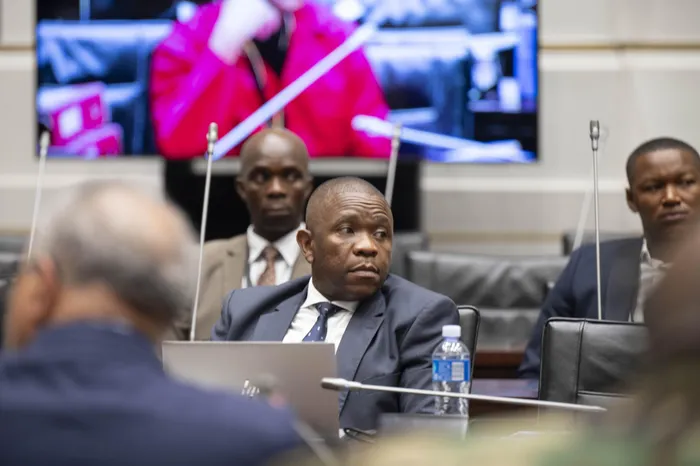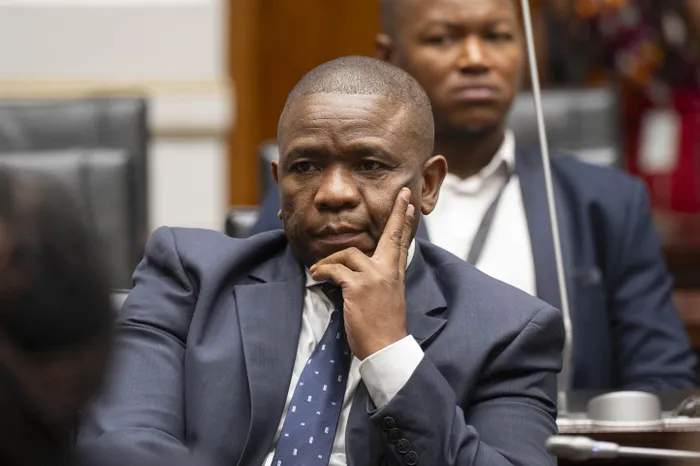Mkhwanazi dismisses argument that task team was a political initiative

KwaZulu-Natal Police Commissioner Lieutenant General Nhlanhla Mkhwanazi appeared before Parliament’s Ad Hoc Committee to testify on allegations of corruption, political interference, and criminal infiltration in the justice system.
Image: Armand Hough / Independent Newspapers
KwaZulu-Natal police commissioner, Lieutenant-General Nhlanhla Mkhwanazi, on Tuesday dismissed a suggestion that the Political Killings Task Team (PKTT) was a political initiative and that the decision to disband it was a lawful political decision.
Replying during his testimony on the first day of the parliamentary inquiry into allegations on security matters, Mkhwanazi said such an argument “won't stand”.
“I will say they are wrong because a Minister of Police is not a member of a political party. The Minister of Police is an executive member that is appointed in terms of the law of the Republic (and) is a cabinet member responsible for policing,” he said.
“I don't think the legislature cares as to which political party the member belongs to. To say it was a political decision, what if the minister is not a politician. I don't think that argument will stand,” Mkhwanazi said.

KwaZulu-Natal police commissioner, Lieutenant-General Nhlanhla Mkhwanazi, appearing before the parliamentary inquiry on the first day of public hearings
Image: Photo: Armand Hough
He was responding to chief evidence leader Norman Arendse who said it could be argued by “some implicated” that the PKTT was a political initiative and its dissolution was a political decision that was entirely lawful.
Mkhwanazi explained that the PKTT was formed after President Cyril Ramaphosa visited the house of an ANC member Musawenkosi Mchunu, who was killed in Pietermaritzburg in May 2018.
He said Ramaphosa had announced that he would establish an inter-ministerial committee (IMC) to come up with solutions to mitigate the incidents of murders of politicians in KwaZulu-Natal.
“It was a direction of the head of state to a group of ministers, and subsequently work was needed and officials had to get busy with.”
Mkhwanazi also said the IMC gave a directive to the SAPS management to develop a plan with coordinated efforts to investigate political killings.
The plan was developed and approved by the national police commissioner and a presentation was made to the IMC, which endorsed it and was happy with it.
He said the PKTT would give updates on their work to the IMC, which in turn would brief the media on the interventions they were making.
‘That is how it has been working until towards the end of 2023. Thereafter the IMC has not sat.”
The IMC, Mkhwanazi said, has not convened since after the 2024 national and general elections after new ministers were appointed to the portfolios in the security cluster.
“We don’t know what the reason is,” he said.
Mkhwanazi also said the PKTT plan that was given to the IMC was developed by the team, including him as then acting provincial commissioner and national deputy commissioners at the time.
“The national (police) commissioner approved the plan, developed by group of senior officials that were involved.”
Mkhwanazi said the PKTT was accountable to the national commissioner, who accounted to the IMC.
He disagreed that the PKTT was a political initiative implemented by the national commissioner.
“It was an executive authority decision executed by the heads of departments within the security cluster, which included the national commissioner,” Mkhwanazi said.
Mkhwanazi was giving evidence after the parliamentary inquiry resumed on Monday following a five-hour long adjournment when MPs were not happy with his “supplementary statement”.
Cape Times
Related Topics: